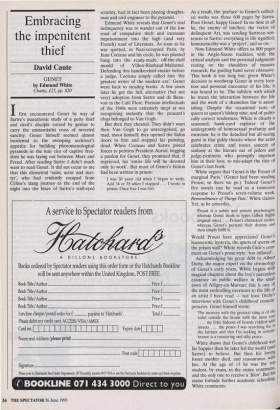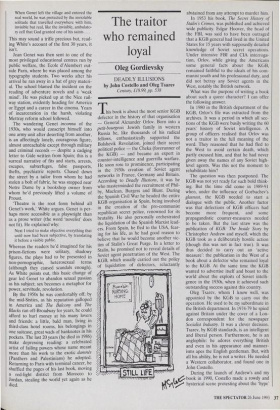Embracing the impenitent thief
David Caute
GENET
by Edmund White Chatto, f25, pp. 820 Ifirst encountered Genet by way of Sartre's marathonic study of a petty thief and devil's disciple cursed by genius to carry the existentialist cross of inverted sanctity. Genet himself seemed almost incidental to the swooping architect's appetite for building phenomenological pyramids in the huis clos of captive free- dom he was laying out between Marx and Freud. After reading Sartre I didn't much want to read Genet. It did not occur to me that this elemental 'saint, actor and mar- tyr', who had evidently escaped from Celine's slang journey to the end of the night into the blaze of Sartre's wall-eyed
scrutiny, had in fact been playing draughts- man and civil engineer to the pyramid.
Edmund White reveals that Genet's real delinquency was to wander out of the low road of compulsive theft and incessant imprisonment into the high (and very French) road of Literature. As soon as he was spotted, in Nazi-occupied Paris, by Jean Cocteau and his circle, he was planted bang into the ready-made, off-the-shelf mould of Villon-Rimbaud-Mallarme. Defending this handkerchief-stealer before a judge, Cocteau simply called him 'the greatest writer of the modern era'. Genet went back to stealing books. A few years later he got the full, alternative (but not very) adoption from Sartre and de Beau- voir in the Café Flore. Parisian intellectuals of the 1940s were extremely inept at not recognising instantly that the peasant's clogs belonged to Van Gogh.
But then they cheated. They didn't want their Van Gogh to go unrecognised, go mad, shoot himself; they opened the Salon doors to him and stopped his painting, dead. When Cocteau and Sartre joined forces to petition President Auriol, begging a pardon for Genet, they promised that, if reprieved, his 'entire life will be devoted only to work'. But most of Genet's fiction had been written in prison:
I was 30 years old when I began to write. And 34 or 35 wlien I stopped . . . I wrote in prison. Once free I was lost.
As a result, the 'preface' to Genet's collect- ed works was those 600 pages by Sartre. Poor Genet, happy Genet! In no time at all he, the enemy of intellect, the vector of delinquent Art, was sending Sartrean sen- tences to Sartre: everything in life signified; homosexuality was a 'project', and so on.
Now Edmund White offers us 800 pages in the Anglo-Saxon tradition, with the critical analysis and the personal judgments resting on the shoulders of massive research, the guiding hand never obtrusive. This book is too long but, given White's decision to wordwrap Genet in every loca- tion and personal encounter of his life, it was bound to be. The subtlety with which he traces the interaction between the life and the work of a shameless liar is aston- ishing. Despite the occasional note of queen to queen's bishop nine, and of politi- cally correct tenderness, White is clearly a seasoned, hawk-eyed explorer of the undergrowth of homosexual profanity and exorcism: he is the detached but all-seeing guest in that giddy theatre where the artist celebrates crime and tosses saucers of sodomy at the literate ear of jailers and judge-penitents who promptly imprison him in their love, to mis-adapt the title of Genet's last book.
White argues that 'Genet is the Proust of marginal Paris.' (Genet had been stealing Proust, so there we go.) 'Indeed Genet's five novels can be read as a conscious response to Proust's seven-volume work, Remembrance of Things Past,' White claims. Yet, as he concedes,
Proust is a subtle and patient psychologist, whereas Genet deals in types (albeit highly original ones) . .. Proust's characters evolve, whereas Genet's portend their destiny and then simply fulfil it.
Would Proust have appreciated Genet's homoerotic hysteria, the spurts of sperm on the prison wall? White records Gide's com- ment on Genet's prose style: 'too inflated'. Acknowledging his great debt to Albert Dichy, the major expert on the chronology of Genet's early years, White begins with magical chapters about the boy's parentless existence on public welfare in the small town of Alligny-en-Morvan: this is one of the most enthralling overtures to the life of an artist I have read — not least Dichy's interviews with Genet's childhood contem- poraries. Genet himself wrote: The memory with the greatest sting is of the toilet outside the house with the slate roof ... my little hideout of boards riddled with insects ... the peace I was searching for NI the latrines and that I'm seeking in remem- brance is a reassuring and silky peace.
White shows that Genet's childhood was far happier than he later led the world (and Sartre) to believe. But then his loving foster mother died, and reassurance with her. At the age of 13 he was the top student, by exam, in the entire commune., and the only one to receive a 'Bien'. But his status forbade further academic schooling. White comments:
When Genet left the village and entered the real world, he was protected by the inviolable solitude that travelled everywhere with him, invisible but real, like the invisible, ambulato- ry cell that God granted one of his saints .
This may sound a trifle precious but, read- ing White's account of the first 30 years, it isn't.
Jean Genet was then sent to one of the most privileged educational centres run by public welfare, the Ecole d'Alembert out- side Paris, where he was placed among the typography students. Two weeks after his arrival he ran away in a hat of grey materi- al. The school blamed the incident on the reading of adventure novels and a 'weak mind'. He was picked up at the Nice rail- way station, evidently heading for America or Egypt and a career in the cinema. Years of incarceration in the harsh, violating Mettray reform school followed.
The wandering Genet inconnu of the 1930s, who would conscript himself into one army unit after deserting from another, is an affectingly lonely, courageous figure, almost unreachable except through military and criminal records — despite a cadging letter to Gide written from Spain; this is a surreal narrative of fits and starts, arrests, escapes, subterfuges, false passports, thefts, psychiatric reports. Chased down the street by a tailor from whom he had stolen a bolt of fabric, he was stopped near Notre Dame by a bookshop owner from whom he'd previously lifted a volume of Proust.
`Theatre is the root form behind all Genet's work,' White argues. Genet is per- haps more accessible as a playwright than as a prose writer (the word 'novelist' does not fit). He explained why:
Next I tried to make objective everything that until now had been subjective, by translating it before a visible public.
Whereas the readers he'd imagined for his prison-fictions were solitary, shadowy figures, the plays had to be presented in non-pornographic, heterosexual terms (although they caused scandals enough). As White points out, this basic change of gear led Genet to abandon sexual passion as his subject; sex becomes a metaphor for power, servitude, revolution.
By the 1950s he was comfortably off; by the mid-Sixties, as his reputation galloped in America and The Balcony and The Blacks ran off-Broadway for years, he could afford to hurl money at his many lovers and friends: a little, bald man, living in third-class hotel rooms, his belongings in one suitcase, great wads of banknotes in his pockets. The last 20 years (he died in 1986) make depressing reading: a celebrated artist of failing powers whose name meant more than his work to the exotic damnes (Panthers and Palestinians) he adopted. Returning to Paris with terminal cancer, he shuffled the pages of his last book, moving a red-light district from Morocco to Jordan, stealing the world yet again as he died.



























































 Previous page
Previous page